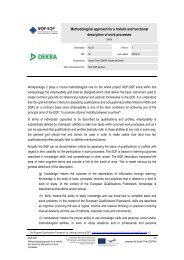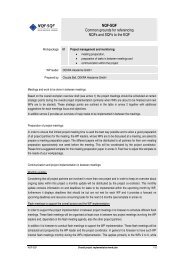Overview of National Qualification frameworks - Project-Nqf-Sqf
Overview of National Qualification frameworks - Project-Nqf-Sqf
Overview of National Qualification frameworks - Project-Nqf-Sqf
Create successful ePaper yourself
Turn your PDF publications into a flip-book with our unique Google optimized e-Paper software.
3 Referencing the EQF3.1 Interfaces to the EQFAs already mentioned, the EQF descriptors are used as a basis for the NQF in Austria, Malta…Plans for referencing the NQF to the EQF for the current year 2011 exist in Greece, Romania. In Italy the referencing processis on its way.In Romania the <strong>National</strong> <strong>Qualification</strong>s Authority, the <strong>National</strong> Agency for Quality Assurance in Higher Education and the<strong>National</strong> Agency for Quality Assurance for Pre-university Education (IVET) are working within their level <strong>of</strong> competence. Thenational steering group for referencing has yet to be decided.It is also planned to draw up the report on the referencing <strong>of</strong> the Austrian NQF to the EQF in the course <strong>of</strong> 2011. Key actors inthe NQF development process are the Ministry <strong>of</strong> Education, Arts and Culture (bmukk) and the Ministry <strong>of</strong> Science andResearch (bmwf). These ministries head the so-called NQF Steering Group, in which members <strong>of</strong> all ministries, the socialpartners and the Laender are represented. This group will also be the decision making body for the EQF referencing report. Itis planned to discuss the draft Austrian EQF referencing report with the NQF Steering Group which compromises stakeholdersfrom different sectors and different parts <strong>of</strong> the qualifications system.Key actors in the NQF development process are the Ministry <strong>of</strong> Education, Arts and Culture (bmukk) and the Ministry <strong>of</strong>Science and Research (bmwf). These ministries head the so-called NQF Steering Group, in which members <strong>of</strong> all ministries,the social partners and the Laender are represented. This group will also be the decision making body for the EQF referencingreport. It is planned to discuss the draft Austrian EQF referencing report with the NQF Steering Group which compromisesstakeholders from different sectors and different parts <strong>of</strong> the qualifications system.OeAD (Österreischischer Austauschdienst, Austrian agency for international cooperation in education and research) wasdesignated the national coordination point (NCP) in March 2010. It will be responsible for developing a home page on NQF andshould become the main information desk for citizens and institutions. One <strong>of</strong> the tasks <strong>of</strong> the NCP is to support the EQFreferencing process; concrete activities have not been planned so far.The Austrian EQF referencing report will be presented as one report but it will be developed in two parts. The Austrian NQF willcomprise <strong>of</strong> eight levels, with levels 6 to 8 being divided into a ‘Bologna-strand’ and into a ‘non-Bologna-strand’. Bachelor-,Master- and PhD-degrees will be classified on the basis <strong>of</strong> the Dublin descriptors, while qualifications outside the Bolognaarchitecture will follow the NQF descriptors. Therefore the bmwf is responsible for preparing relevant information related to the‘Bologna-strand’ and the bmukk will cover all other areas.Both ministries have commissioned external experts for writing the report and will coordinate the process together. The workhas been supported by the EQF test and pilot projects, notably the Leonardo da Vinci ‘EQF-Ref: Referencing process –Examples and proposals.The definition <strong>of</strong> criteria for the NQF classification, <strong>of</strong> the classification procedure and the NQF governance structure will bepublished in an NQF Manual, which will be included in the Annex.The Manual address the following issues:How do qualifications have to be structured and described to be ‘NQF-classifiable’?__What information has to be provided when applying for classification?__What criteria have to be met for the classification on a particular level?__Which steps have to be taken when applying for classification?__Who are the stakeholders involved in the NQF process and what are their tasks?__Which implications does a classification have?A template has been prepared for presenting qualifications that should be classified in the NQF. The proposed template asksfor providing arguments for allocating a qualification to a certain level. The argumentation will have to be based on the EQFdescriptors and the above mentioned Austrian explanations/details/specifications and could additionally be based on:__Relation to other qualifications from the same learning or working area or to similar qualifications already classified__International comparison (e.g. transnational agreements on mutual recognition <strong>of</strong> qualifications, European projects etc.)NQF-SQF:"This project has been funded with support from20/21<strong>Overview</strong> <strong>of</strong> <strong>National</strong> <strong>Qualification</strong>prepared by 3s research laboratory<strong>frameworks</strong>the European Commission. This publicationreflects the views only <strong>of</strong> the author, and theCommission cannot be held responsible for anyuse which may be made <strong>of</strong> the informationcontained therein."




